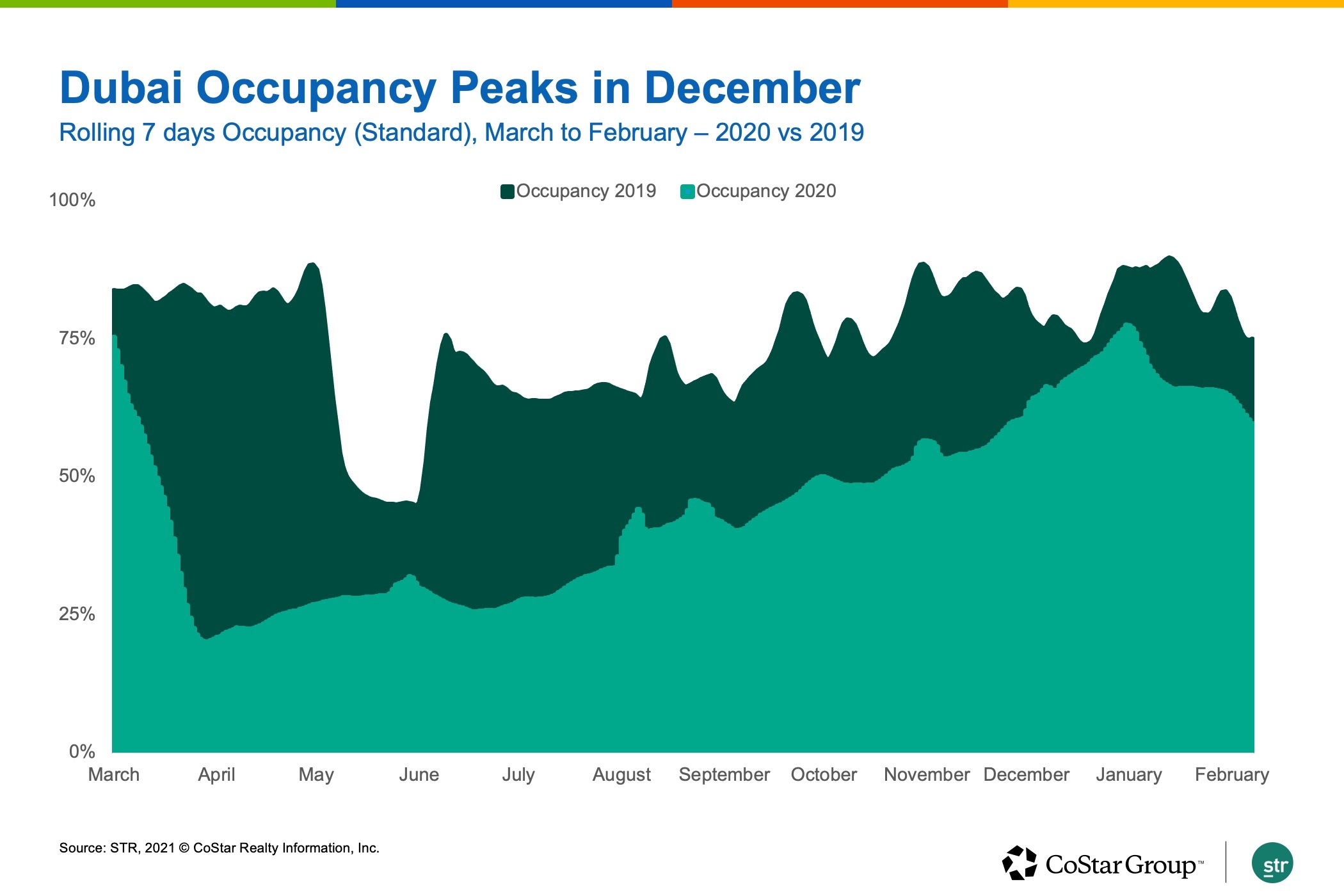Hotels in Dubai, United Arab Emirates, have fared well throughout the COVID-19 pandemic, and the market is poised to see a return in both occupancy and room-rate growth through various demand generators.
Speaking during the "Market Spotlight: UAE Focus on Dubai" session as part of the online Hotel Data Conference: Global Edition, Philip Wooller — STR's area director for Middle East and Africa — said Dubai has steadily increased on a week-to-week basis from early pandemic occupancies of 20%, climbing to a peak of close to 80% on Dec. 31, 2020. STR is CoStar's hospitality analytics firm.
An increasing number of COVID-19 cases and new restrictions did account for the drop in occupancy in the early part of 2021, he said, but "business is still hovering around the 60% occupancy mark, with some very strong room rates, particularly on the weekends."
Wooller said optimism is rising in the city of Dubai as current restrictions are now starting to lift, and 2021 could see some return to growth in both occupancy and, to a lesser extent, room rate.
Future demand drivers include the Dubai Expo in October 2021.
"This could be the catalyst to showcase Dubai to the rest of the world that it is safe and open for business again," he said.
Supply in the UAE
The UAE has been able to successfully absorb a large supply increase over the last decade, Wooller said.
"Demand has kept pace, and the UAE is a great example of a very successful, well-balanced, evolving destination," he said.
While supply went from roughly 94,000 rooms in 2009 to 187,000 rooms in 2021, the UAE still stands out as one of the most successful hotel markets in the world.
Room demand in 2020 dropped by 32% but was still better than the global average, which is a 39% decrease, he added.
He said it's possible the UAE over the next five to seven years could see another 250 hotels introduced, amounting to 75,000 rooms. However, those numbers could be considerably lower or higher than predicted. STR is tracking those numbers daily.

Executives' Takes
Hotel executives with properties in Dubai share the same optimism.
Speaking on the "Middle East and Africa Executive Panel" at the conference, Laurent Voivenel, senior vice president of operations and development for EMEA and India and senior vice president of group human resources and talent development at Swiss-Belhotel International, said Dubai is putting a number of things in place to attract investors and foreigners.
This includes the "Dubai 2040 Urban Master Plan," a road map to enhance the appeal of Dubai for investors, tourists and residents as well as to help it withstand global challenges.
Aditya Rajaram, managing director, Radar Holdings, said Dubai's core strength is around trade, logistics and aviation, which have driven Dubai's economy for many years. However, one thing he feels the city is behind on is manufacturing.
The Jebel Ali port "is the unsung hero of Dubai," putting the city on the map, he said.
The combination of Jebel Ali, Dubai's exhibition center and the Al Maktoum International Aiport brings "immense potential to put Dubai in such a driving seat going forward," he added.
Technology and e-commerce are recent catalysts for pushing Dubai forward, as well.
In terms of tourism, Dubai is seeing demand from travelers wishing to blend business with leisure.
Rajaram said the workcation and staycation model is a "tool in the vast tool belt that Dubai has," bringing success to the city over the past six years.
The workcations are appealing to a lot of people, especially the younger generation who doesn't want to be stuck in one office.
"Dubai lends itself well to that model, and if you look at the much wider variety of hotels that are now available from an affordability perspective, people are really able to extend that length of stay," he said.
Diversifying Portfolios
Alex Lee, chief commercial officer of Jumeirah Group, said many consumers are seeking to spend time in multiple accommodation types while staying in Dubai.
"When Jumeirah first launched its workcation product, we expected to see very long lengths of stays, but what we're actually seeing is that there's a continual new phase of arrivals coming into our properties because consumers are choosing to move about," he said.
Jumeirah is working on planning strategically around its portfolio, looking at how to bring more synergies between its property types.
"I see that as being one of the key things that will drive our future growth in terms of development pipeline and projects that we're working on behind the scenes," he said.
His company is also investing in a review of its guest segmentation insights. This was an opportune time to start with a blank sheet and reexamine that, he added, while using current guest insights to help plan.
Voivenel said Swiss-Belhotel International recognizes that not everyone can afford the "five star" hotels, and his portfolio weighs heavier on the "two-, three- and four-star" market.
In Dubai, and across the members of the Gulf Cooperation Council, there is still a strong attraction toward the higher-end hotels, he said.
To cater to all types of demand, he said at some point there will need to be more diversification among offerings within Dubai.
"A backpacker will not spend 5,000 dirhams ($1,361)," he said. "We need to match the customer's expectations."
The baby boomer generation will also be retiring soon, choosing to spend heavily on leisure activities. But the new generation entering the market might not have those financial resources, he said.

